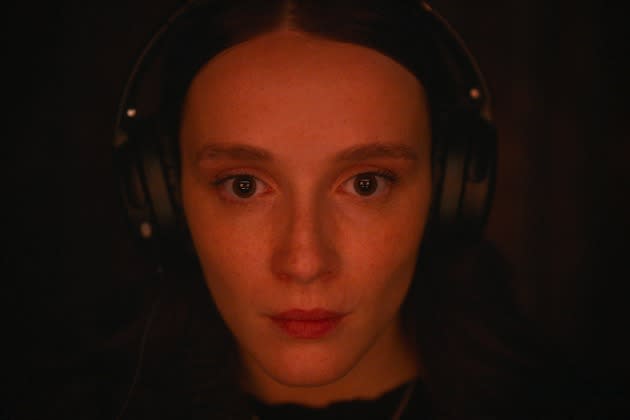‘Red Rooms’ Review: A Disturbingly Brilliant Psychological Horror – Karlovy Vary Int’l Film Festival


The unseen and the obscene are the subject of Pascal Plante’s disturbingly brilliant psychological horror Red Rooms, which takes an overused genre — the serial killer movie — and an often-misused technique — dark Lynchian surrealism — and somehow alchemizes the two into something new and original. It’s strong meat for sure (the courtroom-drama framing is deceptive, since this is not really a film about justice), but word-of-mouth cult status beckons and a healthy nightlife on the genre circuit is assured.
Much of the plot has already happened by the time the film starts. As the crimson opening credits roll over Vincent Biron’s stark, steely blue lensing, a young woman named Kelly-Anne (Juliette Gariépy) wakes up and takes a bus to a tall, sterile building. Inside, the frame becomes alive with color as Kelly-Anne passes through security and takes her seat in a bright, white, fluorescent-lit courtroom. On trial is Ludovic Chevalier (Maxwell McCabe-Lokos), aka The Demon of Rosemont, who is accused of the brutal murders of three young girls between the ages of 13 and 16. Giving Chevalier his notoriety is the nature of his crimes: the victims were sadistically tortured before they were killed, and for the benefit of a paying audience who watched it happen, live, on the dark web.
More from Deadline
‘Empty Nets’ Trailer: A Young Couple Battle Tradition In Iran’s Karlovy Vary Competition Pic
Karlovy Vary's Eastern Promises Industry Section Announces Award Winners
New Karlovy Vary Hollywood Scholarship Involving UTA & Range Media Partners Unveils First Recipient
The prosecuting attorney’s opening address lays out the stark brutality of the case, with the emotionless Chevalier, confined to a Perspex case, watching from the sidelines. The case rests on two graphic half-hour videos, since the third cannot be found, but Chevalier’s defense team claim that he is a wronged man, “a model citizen” who has never been in trouble with the law in all his 39 years on earth. The chief flaw in the prosecution’s argument, they add, is that no suspicious amounts of money have passed through his account, and he has shown no signs of living beyond his means.
Despite the overwhelming amount of circumstantial evidence, not everyone is convinced of Chevalier’s guilt. On her second day at the trial, Kelly-Anne meets Clémentine (Laurie Babin), a murder groupie who has fallen in love with Chevalier, claiming the videos were faked and that the trial is “a big show.” The two become unlikely allies, but the power-balance of their friendship is unsettled when the courtroom is closed while the two existing “snuff” videos are shown to the court. Not only has Kelly-Anne seen them already, but she also has them on a flashdrive. Clementine begs to watch them, and when she does, the cruelty of what she sees causes her to re-evaluate her life choices and go home.
Kelly-Anne, however, continues to appear in the courtroom. But why? This, not the motivations of the clearly unhinged killer, whoever it turns out to be, is the core of this grimly imaginative thriller. Throughout the first hour, it is clear that something is not right about the Chevalier case; newspaper articles talk of “a missing piece” to the puzzle, and the elusive third video has taken on mythological status online. Does Kelly-Anne hold the key, and, if she does, is she complicit? The tension builds slowly until it becomes almost unbearable, culminating in a nightmarish scene in which Kelly-Anne, with freshly dyed blonde hair, puts in blue contact lenses and takes off her coat to reveal that she is wearing a school uniform of the exact kind worn by the third and final victim, to whom she bears an uncanny resemblance. As the bailiffs remove her, the previously impassive Chevalier looks up and waves.
Again, why? Plante never quite reveals but instead layers the film with enough nuance so that we start to get a picture of Kelly-Anne’s emotional state. Her modeling career — along with Dominique Plante’s distinctly Euro score, perhaps a subtle nod to Italian giallo — takes a hit when even the fetishist website Dream to Dare cancels a photoshoot, citing rumors about her “extreme” interests, an oblique reference to BDSM. In which case, one can read the movie as an S&M story of a woman who has somehow objectified and consumed both the killer and the victim, a duality that counters her kindness to Clémentine with an unknowable capacity for depravity that she lives out in cyberspace.
Significantly, Kelly-Anne’s online handle is “Lady of Shalott”, a reference to Tennyson’s poem about a woman in Arthurian times who was cursed so that she might only see the outside world reflected in a mirror. Kelly-Anne’s mirror is the dark web, and Gariépy’s gripping, icy performance makes two hours in her odd but strangely focused presence both unnerving and unforgettable.
Title: Red Rooms
Festival: Karlovy Vary (Crystal Globes Competition)
Director/screenwriter: Pascal Plante
Cast: Juliette Gariépy, Laurie Babin, Elisabeth Locas, Maxwell McCabe-Lokos
Running time: 1 hr 58 min
Sales agent: Nemesis Films
Best of Deadline
Hollywood & Media Deaths In 2023: Photo Gallery & Obituaries
2023 Premiere Dates For New & Returning Series On Broadcast, Cable & Streaming
Sign up for Deadline's Newsletter. For the latest news, follow us on Facebook, Twitter, and Instagram.